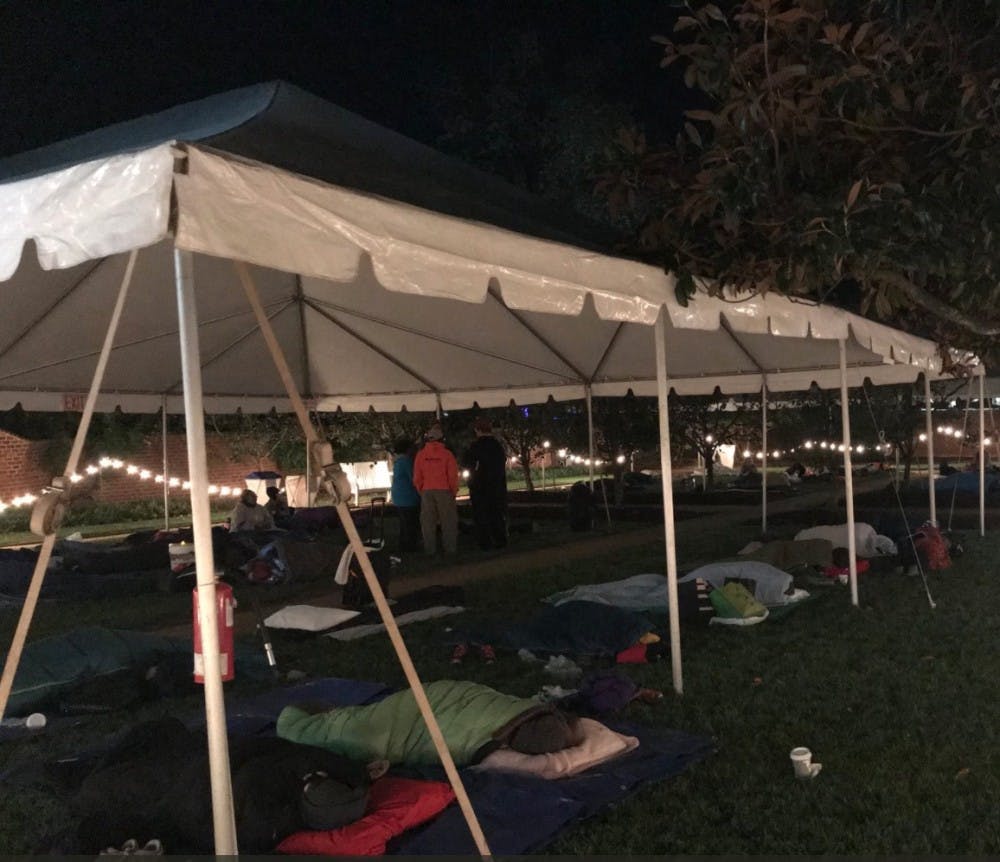The University is partnering with the Slave Dwelling Project in a four-day symposium to spark dialogue about the history and legacy of slavery at the University and other public institutions. The Slave Dwelling Project held a discussion Wednesday night on race and slavery at the University followed by an overnight stay in Pavillion Garden IX located behind McGuffey Cottage, an outbuilding of the Academical Village formerly used as a slave living and work space.
This event was the largest sleep-in the Slave Dwelling Project has hosted, with over 75 registered participants.
The Slave Dwelling Project is partnering with the University through the President’s Commission on Slavery and the University and will participate in events on Grounds over the next four days.The symposium, titled “Universities, Slavery, Public Memory and the Built Landscape,” includes panel discussions on a range of topics such as the role of slavery in other universities.
Joe McGill founded the Slave Dwelling Project in 2010 to help foster dialogue about the history of slavery in public spaces around the country. His organization has held sleep-ins at over 100 different slave dwellings sites across 19 different states and the District of Columbia.
“We find slave dwellings wherever they exist because the slave dwellings tell the stories of those who were slaves,” McGill said. “We have a tendency to tell the stories of the enslavers because that’s a comfortable place to be, but for those who were enslaved, we tend not to want to go there. And this projects takes us there.”
Prior to the sleep-in, students, faculty, members of the Charlottesville community and out-of-state visitors attended an introductory discussion pertaining to the history of slavery at the University.
Third-year College student Isabel Yoder attended the event because she said she did not adequately understand the history of slavery at the University, especially in light of the events that occurred in Charlottesville in August.
“Definitely the interest [in the University’s history of slavery] heightened after the events in August,” Yoder said. “I think it’s something I should understand while I’m here.”
During the event, Brendan Nigro, third-year College student and chair of the University Guide Service, discussed the history of slavery at the University. Nigro emphasized the need to create a “more complete story” of the University’s past, as well as the legacy of its founder, Thomas Jefferson. He described how the gardens in which participants of the sleep-in stayed are surrounded by serpentine walls, originally designed by Jefferson to contain the noise of the slaves who once worked there.
“[It was] a very intentional choice ... To section off these people,” Nigro said. “The walls [were] also higher than they are today, in 1825. And so this is very intentional architectural segregation for Jefferson.”
Nigro praised an “incredible amount of courage from students [and] faculty,” in recent years, aimed at painting a more complete picture of the University’s past.
He mentioned the installation of a plaque in 2007, commemorating the slaves that helped build the University from 1817 to 1826, as well the Freedom Ring project, to illuminate the University’s association with slavery.
McGill also commended the University’s recent efforts to confront its history and said he believes the University can serve as a model of other universities with similar histories.
“I think it’s beautiful. I think that other institutions of higher learning should follow the same pattern,” McGill said. “We’re hoping U.Va. can be that example for other institutions of higher learning can follow. Having this conference is part of that process.”
April Burns, who participated in the overnight stay, is a Charlottesville resident whose ancestors were Monticello slaves. She praised the University’s decision to engage with its complicated past with slavery and the actions it has been taking to address it.
“I think the University is very progressive in their dealing with slavery here at the institution,” Burns said. “I directly [credit] that to Terry Sullivan, who I think has done a phenomenal job in bringing that dialogue out. I’m very proud of the conversations that are happening here right now.”
The legacy of slavery is personal for Burns, and she said she believes the work of the Slave Dwellings Project is important to make progress on this issue.
“It’s always tough to walk in these spaces, there’s so much pain in the truth,” Burns said. “But it’s good … To see so many people out and supporting the desire, the need to recognize and talk about slavery comfortably. There is still some work to do, but it’s getting better.”
McGill said he values the diversity of the group present at the event Wednesday night and hopes to see continued participation of all races in the ongoing dialogue about the legacy of slavery.
“I’m hoping we can maintain the diversity we see here — diversity within the group,” McGill said. “Just catering to one race or the other, that’s not really what I’m trying to achieve.”







